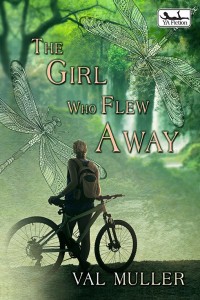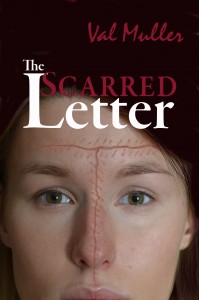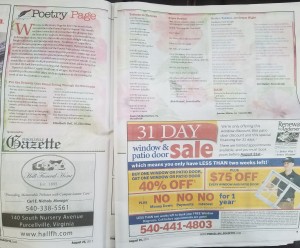Welcome to the Spot Writers. This month’s prompt is: Write about a character whose one ability is to amplify the best traits in others. Who would they hang around? Who would they choose to avoid?
Today’s post comes to your from Val Muller, author of the young adult novel The Girl Who Flew Away.
The Herald
By Val Muller
I came for a Wisher, a little boy sitting on a rusty swing in a lonely park after dark. His was a Genuine Wish, not a superficial one like most. Some ask for ponies or money, games or toys. True Wishers ask for things that matter.
He asked for his parents to love again.
A Wish intangible for him as stardust in the vacuum of space.
He first saw my twinkle floating above the park, shimmering in the darkened sky. I descended with his Wish and landed at the edge of a fence. I had to move quickly because the boy stood right away to investigate. His life at home was so strained, he’d lost all fear and sense of self preservation.
I turned first into a glowing flower, tempting him to pluck me, but I knew that form would never last. The flowers here are ephemeral, not like the sentient ones in the outer planets of Myler. But in the instant her reached to pluck me, I felt his skin and knew his mind. And so in the darkness I disintegrated into the earth and followed the rooty passages into the brush, where I emerged as a puppy.
It was one he’d seen on a television show—a cartoon, which is a type of art form on this world. I worked quickly to make myself look a bit more realistic than the two-dimensional ink of his mind. It was enough. In the darkness, the boy cradled me, and with his touch I saw it all:
His mother, taxed and tired at the end of each day, his father grumpy and exhausted from an unfulfilling job. And each nearly looking forward to the dinner table, where they nightly poured their wrath as quickly as they poured their drinks. Dinners were a verbal battle that left the boy nauseous.
His father drank to squash his courage, so that he could not stand up to his boss or his desires or the temptation to lash out with his fists. His mother drank to sharpen her courage, so that she could stand stone still while her husband put another foot through the drywall, or punched through a window, or turned plates into shrapnel. She drank to find the courage to stand stone still as her son ran out to the park every night and to tell him, when he returned, the lie that she never feared his father would turn his wrath on them.
As he held me tight, I saw through his mind the way life used to be, the way it lingered in his memories. His father building and playing each night, constructing roads and bridges for toy vehicles, making anything the boy asked for out of wood and straws and cardboard and love. I saw his mother, happy and young without the stress of an angry spouse, supporting him and reading homework and stories together. A mother who didn’t drink.
In the midnight darkness, he cradled me in his arms. He ran home as his life played in my mind until I knew my task.
A yellow light shone above the stovetop in the kitchen as we entered. His mom sat at the table, a glass of water in front of her. I knew from the boy’s memories that she always sat up this way, waiting for him, making sure he was safe. This time, a new bit of plaster littered the kitchen floor.
She took us both into her arms, her embrace warm and trembling. She didn’t question my presence, but her eyes leaked and she spoke of her childhood and the dog she grew up with. She spoke of how it’d brought comfort to her, a perpetual friend. As her fingers ran through my simulated fur, the stress of her life floated out. I made sure the harmful rays dissipated into the air and into the night.
I knew my task, so I barked once, twice, just the way I heard it in the boy’s memory, a cartoonish bark, until I heard the rustling upstairs. I felt the boy’s father wipe the haze of drink from his eyes and stumble down the stairs. When he saw the tableau before him, the boy getting kisses from his new best friend and the woman embracing them both, his heart melted into tears, and it all came pouring out—in words this time, not in anger—the frustration, fatigue, disappointment. He had only just begun to realize that such is the reality of life on his world. A constant flux, a managing of expectations, a search for the small things that bring joy. He had lost balance.
The three of them sat together, circled around me, the parents’ faces wet with tears and the boy’s sore with the unfamiliar smile of joy.
In their touch, I saw everything. Recovery would be a hard road for the boy’s father, but he would succeed with only two transgressions. He would heal soon enough to be joyed by the news the boy’s mother would save for just the right moment: that the boy would soon be an older brother.
I could not stay for a lifetime, not even for the life of a dog on this planet where life flies by as fast as comets. There was no need of me anymore. I had fulfilled the Wish. I saw how it would happen. The next day, father and son would build me a doghouse out of the wood scraps in the garage, the ones he used to use all the time when he built toys for the boy. While they were sawing, I would disappear. But it would be only a matter of days before the family stumbled upon a box of puppies for sale on the way home from the boy’s school.
They would pick the runt, the one that needed extra love, because of course they’d have to have something to live in the dog house they’d built. Something to build toys for, to center their love around. Something to bring them together. They’d name him Herald.
They would wonder about me for a time, but I cast an order for their memories of me to be brief. In a decade, they would not remember that they had built their doghouse before the arrival of Herald. They did not need memories of the strange light that descended from above and took the clumsy form of a dog in the darkness. They did not need those memories of me. They needed only to remember who they had once been.
***
The Spot Writers—Our Members:
Val Muller: https://valmuller.com/blog/
Catherine A. MacKenzie: https://writingwicket.wordpress.com/wicker-chitter/
Dorothy Colinco. www.dorothycolinco.com
CaraMarie Christy: https://calamariwriting.wordpress.com/




